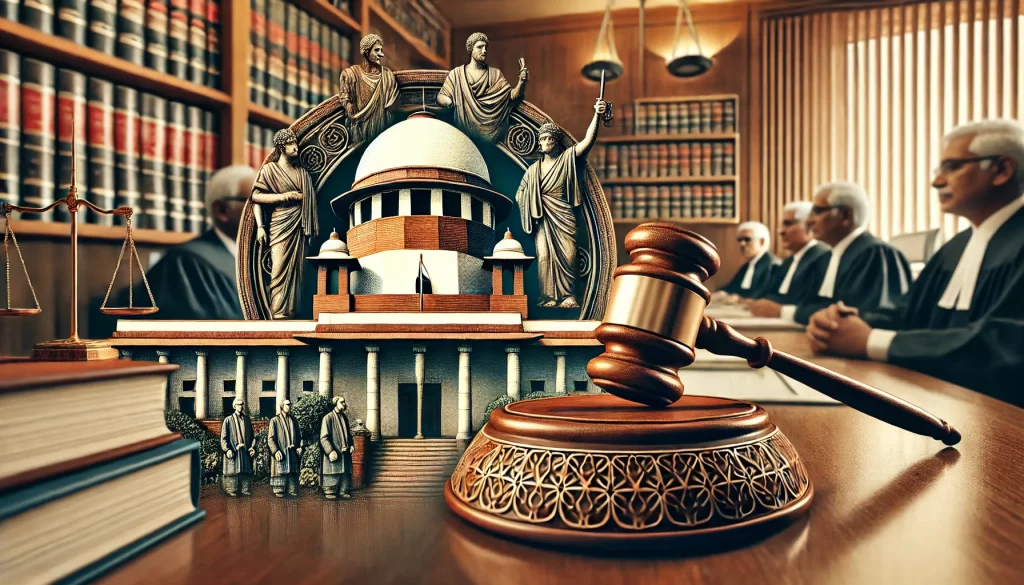Shreya Gupta
On 19th February 2025, the Supreme Court’s Constitutional Bench reserved its judgment on whether courts have the power to modify arbitral awards under Section 34 of the Arbitration and Conciliation Act and the issue of severability of such awards. The Bench comprising Chief Justice of India (CJI) Sanjiv Khanna and Justices BR Gavai, PV Sanjay Kumar, KV Viswanathan, and Augustine George Masih, heard extensive arguments from senior lawyers on the subject.
Section 34 of the Arbitration and Conciliation Act provides the framework for challenging arbitral awards, specifying grounds such as violations of public policy, lack of jurisdiction, or improper notice. However, it does not permit a review of the merits of the award. Courts have generally interpreted this section narrowly to uphold the principles of finality and minimal judicial interference. Section 37 of the Act, which governs appeals against certain orders, also follows the principle of limiting judicial intervention in arbitration matters.
The issue gained prominence when a Bench in February 2024, consisting of Justices Dipankar Datta, KV Viswanathan, and Sandeep Mehta, raised key questions about whether courts can modify awards under Section 34 and whether previous Supreme Court rulings had provided inconsistent guidance. The matter was then referred to a larger Bench led by CJI Khanna.
During the hearings, Justice PV Sanjay Kumar noted that Parliament had consciously excluded the power of modification from Section 34, indicating an awareness of potential complications in allowing modifications. CJI Khanna remarked that procedural review is inherently available to courts and tribunals without requiring explicit statutory provisions. Justice BR Gavai pointed out that if the legislature had intended to prohibit modifications, it would have done so explicitly, as seen in Singapore’s arbitration framework.
Senior Advocate Arvind Datar argued that the term “set aside” in Section 34 should not be interpreted rigidly and should include partial setting aside of an award. He contended that courts inherently have the power to cure patent injustices, and the concept of severability should apply beyond Section 34(2)(a)(iv). He also distinguished between curable and incurable patent illegalities, asserting that courts should be able to correct curable defects.
Conversely, Senior Advocate Saurabh Kirpal opposed this view, arguing that Section 34 does not grant modification powers and that courts should not insert words into statutes unless absolutely necessary. He emphasized that the Act has functioned effectively for decades without modification powers.
Senior Advocate Darius Khambata highlighted the Arbitration Act’s objective of expeditious dispute resolution, arguing that if courts lack modification powers, arbitration proceedings may have to restart entirely, undermining efficiency. He maintained that Section 34 already contains the power to modify awards without requiring additional language.
Senior Advocate Gourab Banerji stressed that arbitral awards should not be equated with judgments and emphasized the importance of party autonomy in arbitration. Senior Advocate Gaurav Pachnanda argued that Section 34 does not grant appellate jurisdiction and only allows for annulment of an award, not its modification.
Senior Advocate Shekhar Naphade contended that the legislature imposes clear restrictions on judicial power when necessary and that the absence of an explicit prohibition on modification suggests that such power exists. Similarly, Senior Advocate Prashanto Chandra Sen stated that partial setting aside of an award is effectively a form of modification.
Senior Advocate Ritin Rai argued that arbitration aims for quick and cost-effective dispute resolution. He emphasized that, after passing an award, the arbitral tribunal loses its authority except in limited cases under Sections 33 and 34(4). While Section 34(4) allows remission of an award for procedural corrections, it does not enable substantive modifications.
Solicitor General Tushar Mehta, in his rejoinder, asserted that The Arbitration Act is a complete code and that the omission of modification powers in the 1996 Act was a deliberate choice. He argued that the legislature intended to limit judicial intervention to a supervisory role rather than allowing courts to modify arbitral awards.
The Supreme Court’s decision in this case will have significant implications for the interpretation of Section 34 and the extent of judicial intervention in arbitration proceedings.
Instagram: Click here.
LinkedIn: Click here.
For Collaboration and Business: info.desikaanoon@gmail.com

